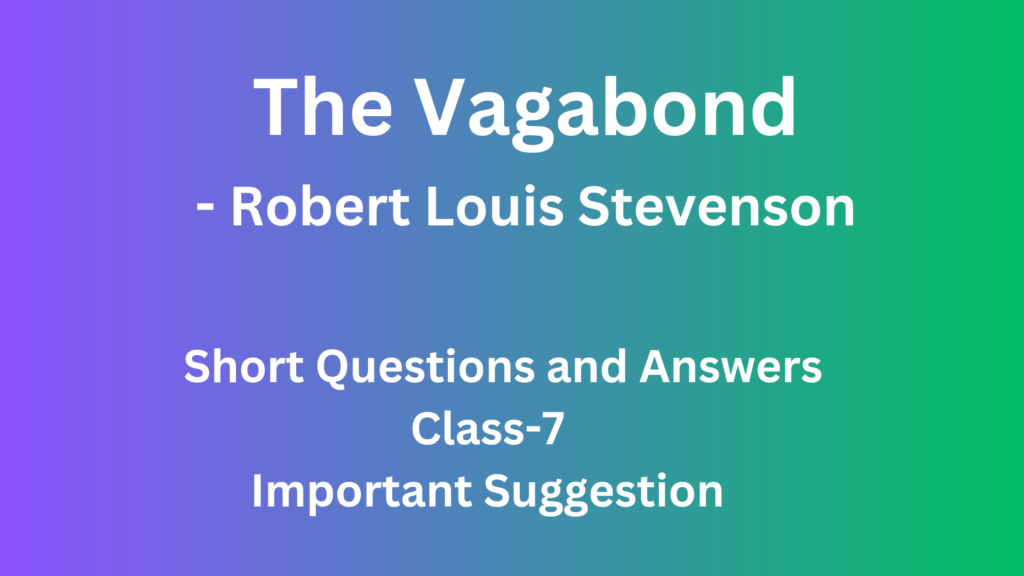
Biographical Sketch of the poet:
Robert Louis Balfour Stevenson (13 November, 1850 – 3 December, 1894) was a Scottish novelist, poet, essayist and travel writer whose most famous works are Treasure Island, Kidnapped and The Strange Case of Dr. Jekyll and Mr. Hyde.
A literary celebrity during his lifetime, Stevenson was one of the greatest writers whose works are translated in many languages all over the world. His works have been admired by many other writers, including Jorge Luis Borges, Ernest Hemingway, Rudyard Kipling, JM. Barrier and GK Chesterton, who said of him that he “seemed to pick the right word up on the point of his pen, like a man playing spillikins”. Stevenson was a celebrity in his own time, but with the rise of modern literature after World War I, he was seen for much of the 20th century as a writer of the second class, relegated to children’s literature and horror genres. He is now being re-evaluated as a peer of authors such as Joseph Conrad and Henry James.
About the poem:
“The Vagabond” depicts the longing of a carefree life in close contact with nature. He wants the life he loves which is under the care of nature. The Vagabond is prepared to face any consequences or trouble while leading a life in the lap of nature. He is not afraid of the extreme change in the cycle of seasons. He wants the stream by his side, the sky above and the road ahead. He wishes to sleep on a bed of grass from where he can see the stars and dip the bread in river water. All he wants is Nature to surround him.
Short Answers Type Questions:
1) What kind of a life does the Vagabond want?
Ans- The Vagabond wants a life that has close contact with nature. A life which is not confined to the wordly matters and is prepared to endure all kinds of adversities.
2) What are the things that do not interest the Vagabond?
Ans- The things that do not interest the vagabond are wealth, hope, love and friendship.
3) What would the vagabond do when winter falls?
Ans- The vagabond would remain in the lap of nature when winter falls. He would linger in the field. He would not give in to the biting cold of autumn or the frosty winter.
4) How does the poet describe a field in autumn?
Ans- According to the poet a frost – covered field in autumn looks as white as meal.
5) Why does the poet repeat the second stanza once again?
Ans- The poet repeats the second stanza once again to emphasize the carefree spirit of a vagabond. All a vagabond wants is to wander in the midst of nature without caring about the mundane attractions or the misfortune that might fall upon him.
6) What message does the poet want to give through the poem?
Ans- It seems that the message the poet wants to give is that the mundane life blunts the finer senses of a man. Only the life outside the four walls can make him realise the true spirit of life.
Also read: PARAGRAPH WRITING for Class – 7 | Writing Skill
7) What kind of heaven does the vagabond want above his head?
Ans- The vagabond wants ‘ a jolly heaven’ above his head. Here ‘ jolly heaven’ refers to the bright, sunny and clear sky.
8) Where would the vagabond dip his bread?
Ans- The vagabond would dip his bread in the river.
9) What does the poet want to see from his bed?
Ans- The poet wants to see the stars from his bed.
10) What would happen to the birds in the autumn season?
Ans- The excessive cold of the autumn season would silence the bird on tree.
11) How does the frosty field look?
Ans- The frosty field looks as white as ‘meal’.
12) What characteristics of the vagabond’s life do we find in the poem?
Ans- The intense desire to lead a carefree life in close contact with nature characterises the vagabond’s life. He does not desire for riches or friends. He only wants the bright sky above and the road below him.
13) What does ‘blow’ mean? Is the Vagabond prepared to face the below? Or is the Vagabond afraid of blows?
Ans- ‘Blow’ refers to troubles and challenges of life. The Vagabond is prepared to face the ‘blow’ sooner or later.
14) Would the vagabond surrender himself to the adversities of nature? Quote lines from the poem to support your comment.
Ans- The vagabond would not surrender himself to the adversities of nature. He says –
“Not to autumn will I yield
Not to winter even!”
15) Why does the Vagabond pray for heaven and road in the concluding lines?
Ans- The vagabond, in the concluding lines, does not ‘seek’ but ‘ask’ for the heaven and the road as he no longer looks for his desired objects but prays God to grant his prayer so that he can live in close contact with nature.
16) How long does the poet want to lead his life as a vagabond?
Ans- The poet wants to lead his life as a vagabond forever.